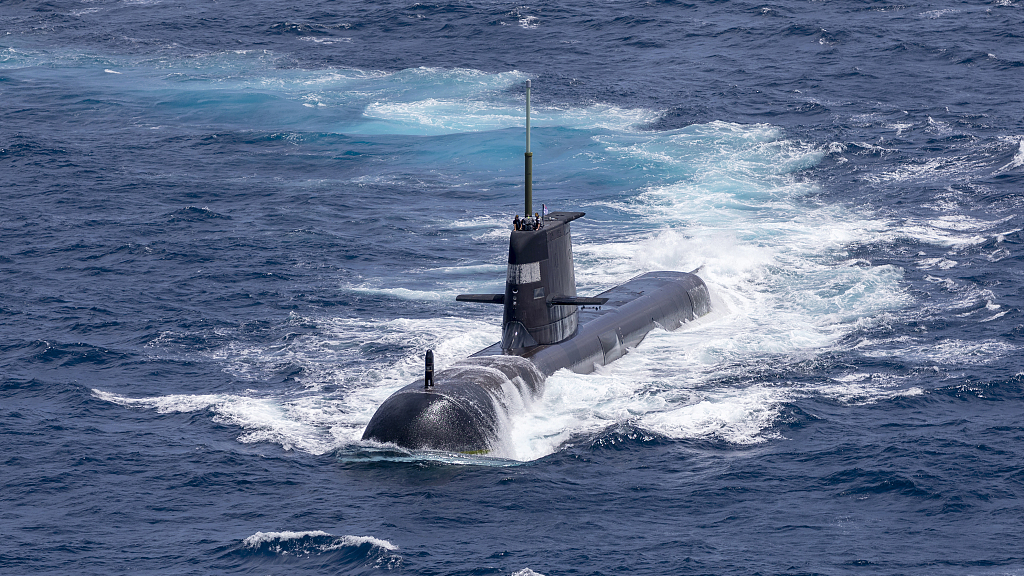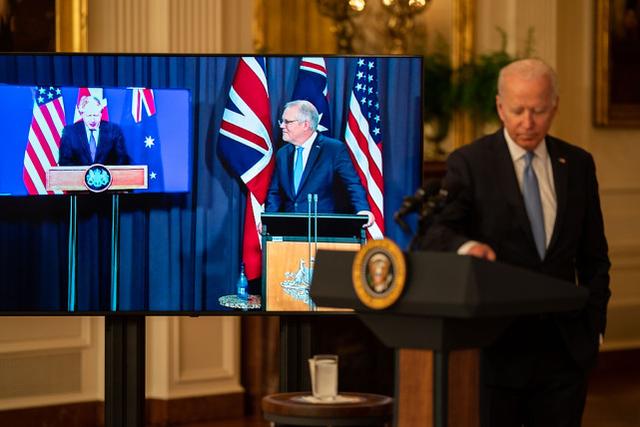
Royal Australian Navy submarine HMAS Rankin is seen during a maritime exercise in waters off Darwin, Australia, September 5, 2021. /CFP
Royal Australian Navy submarine HMAS Rankin is seen during a maritime exercise in waters off Darwin, Australia, September 5, 2021. /CFP
The Australian government's plan to acquire nuclear-powered submarines as part of the AUKUS security pact with the United States and the UK has been met with scrutiny at home and abroad, raising concerns about the country breaching its nuclear non-proliferation obligations.
Last week, Australia signed a formal agreement with the U.S. and the UK to allow the sharing of highly classified nuclear technology. It is the first time that nuclear-powered technology between the U.S. and the UK is being shared with another country.
The submarine deal was first announced in September when the three countries entered a controversial trilateral pact, known as AUKUS, which saw Australia abandon a $90-billion contract with France in favor of the AUKUS arrangement, outraging the French side.
But Australian Prime Minister Scott Morrison has been unapologetic about his handling of the agreement, saying it is "a very important agreement for Australia's future security."
Under the AUKUS deal, Australia would obtain eight state-of-the-art, nuclear-powered submarines capable of stealthy, long-range missions. It also provides for sharing cyber, artificial intelligence, quantum and unspecified undersea capabilities.

U.S. President Joe Biden is in a virtual meeting with Australian Prime Minister Scott Morrison and British Prime Minister Boris Johnson at the White House in Washington, D.C., September 15, 2021. /CFP
U.S. President Joe Biden is in a virtual meeting with Australian Prime Minister Scott Morrison and British Prime Minister Boris Johnson at the White House in Washington, D.C., September 15, 2021. /CFP
The Morrison government insists that Australia would still meet its obligations under the Treaty on the Non-Proliferation of Nuclear Weapons (NPT), and that the deal will not be a precursor to acquiring nuclear weapons.
But during a parliamentary inquiry on Monday, Labor MPs expressed uncertainty over the government's plan to use a loophole in the NPT by claiming that the vessels fueled with weapons grade uranium are for "peaceful purposes."
"If it was determined that was acceptable, we will have broken new ground in weakening the existing non-proliferation regime," Labor MP Josh Wilson said.
The board members of ICAN Australia (the International Campaign to Abolish Nuclear Weapons), made up by experts in the fields of nuclear non-proliferation, international politics and diplomacy, international law, and environmental issues, said in a statement on Monday that they were "strongly opposed to the AUKUS proposal."
"Agreeing to exchange naval nuclear propulsion information is a highly damaging and retrograde step in the broad non-proliferation regime," the statement said.
"No non-nuclear armed nation has acquired such nuclear-powered submarines. Australian acquisition of these will motivate others to do the same… In reality, this transfer would not be seen as an acceptable 'peaceful use' of nuclear energy."
A spokeswoman from Australia's Department of Defense (ADF) told the Indo-Pacific Defense Forum magazine that over the next 18 months, the AUKUS partners will examine the full suite of requirements that underpin "nuclear stewardship" through the pact.
The ADF has also structured its funding to meet the requirements, with total defense spending expected to rise from U.S. $31.7 billion in 2020-21 to U.S. $55.5 billion by 2029-30, the spokeswoman said.

